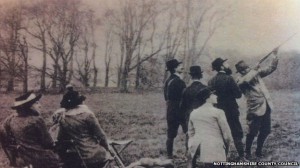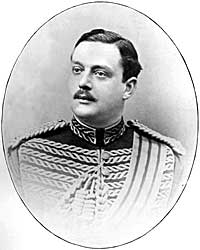Nottinghamshire, and the University College, Nottingham (as it then was) have a direct link to the origins of the First World War and to the Archduke Franz Ferdinand’s misadventures with firearms. Professor John Beckett tells the story of how things might have been so different…
In November 1913 the Archduke Franz Ferdinand, the heir apparent to the Austro-Hungarian Empire, spent some time in England, and this included a visit to Welbeck Abbey, Nottinghamshire. The owner of this former monastic property was the sixth Duke of Portland, who was lord lieutenant of Nottinghamshire, and also President of the University College Council. In the latter position he was spearheading efforts to have the College upgraded to full university status. These efforts had to be put on hold when the war broke out.
The archduke and his duchess travelled to Welbeck by train on 22 November 1913, alighting at Worksop to be driven by carriage to the Abbey. Fellow guests during their week-long stay included the Duke and Duchess of Devonshire, and Arthur Balfour, leader of the Conservative Party.
During the course of the week they spent at Welbeck the archduke enjoyed shooting parties at Clowne Hills, Clipstone and Gleadthorpe, and he and the duchess visited Sherwood Forest, Bolsover Castle and Hardwick Hall.
‘I have often wondered whether the Great War might not have been averted, or at least postponed, had the archduke met his death then and not at Sarajevo the following year.’

The Archduke had an accident with a gun during the shooting. Portland later recalled that ‘One of the loaders fell down. This caused both barrels of the gun he was carrying to be discharged, the shot passing within a few feet of the archduke and myself.’ Portland subsequently reflected: ‘I have often wondered whether the Great War might not have been averted, or at least postponed, had the archduke met his death then and not at Sarajevo the following year.’
Nine months later, and safely back home in Vienna, the archduke and his wife set out on a journey to Sarajevo, the capital of Bosnia Herzegovina to open a hospital. They were aware that this might prove to be a dangerous trip. So it proved when they were assassinated by Gavrilo Princip on 28 June 1914.
The assassination made relations between the Austro-Hungarian government and Serbia even more strained than they already were. Under existing treaty obligations Russia sided with Serbia and Germany with Austria. When Germany invaded neutral Belgium on 3 August 1914, Britain was drawn into the conflict as a result of their alliances with other European states, and war was declared the following day.

Through the war years, the Duke and Duchess of Portland played a leading role locally encouraging enlistment among young men, and supportive activities among young women (such as knitting woollen clothes for soldiers in the trenches).
The Duke continued to chair the College Council, regular meetings which between 1914 and 1918 received reports of former students and serving staff who had died in the conflict. He remained President of the Council until his death in 1943. Nottingham received its charter as a full university in 1948.
Duchess Winifred (1863-1954) nursed injured veterans at Welbeck Abbey during the First World War and her experiences in supporting and also miners led to the creation of Harlow Wood Orthopaedic Hospital in 1929 (closed 1995). She was also responsible for planning and opening a training college that could complete the work of rehabilitation for both veterans and miners – giving injured working men a new trade that would make them economically independent once more. This is still the role of Portland College, near Mansfield.